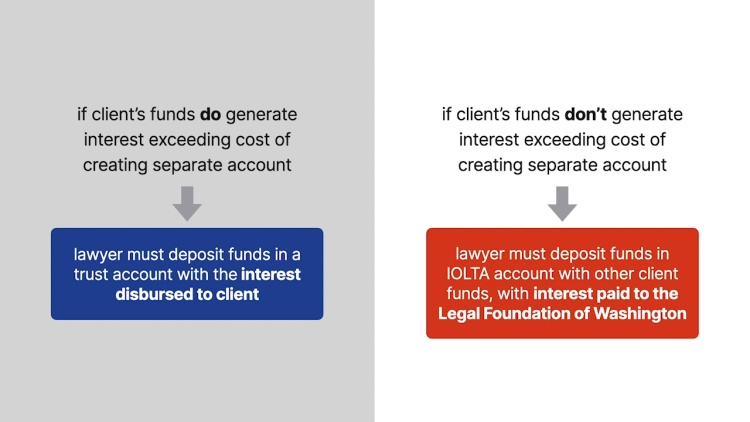Brown v. Legal Foundation of Washington
United States Supreme Court
538 U.S. 216 (2003)
- Written by Megan Petersen, JD
Facts
The State of Washington, along with every other state in the Union, uses the interest on lawyers trust accounts (IOLTA) to pay for charitable legal services for the poor. The program arose out of lawyers’ frequent obligation to hold their clients’ money in trust in bank accounts. Prior to 1980, this money was incapable of earning interest. However, Congress passed a law in 1980 which allowed for the creation of “NOW accounts” to hold clients’ money which earned interest. States could use that interest to pay for free legal services for needy persons. Under Washington law, NOW accounts were used to fund its IOLTA program. The law stipulated, however, that funds which could earn net interest for clients could not be deposited into NOW accounts to fund the IOLTA program. Brown and Hayes (plaintiffs) were clients whose money was placed by their lawyers under the Washington law in NOW accounts, the interest of which was used to fund the IOLTA program. They brought suit in federal district court against the Legal Foundation of Washington (defendant) alleging that the state’s use of this interest earned from their deposited money constituted a taking requiring payment of just compensation under the Fifth Amendment. The district court held for the Legal Foundation of Washington, ruling that Brown and Hayes’ money could not earn them net interest, and that it would not have earned any interest at all without the IOLTA program. The Ninth Circuit Court reversed, however, relying on Phillips v. Legal Foundation of Washington, 524 U.S. 156 (1998), which held that funds contained in IOLTA program accounts were the property of the principal's owner. The Ninth Circuit also held that the just compensation due was measured by the amount of interest plaintiffs would have earned had their funds been deposited in non-IOLTA accounts. The United States Supreme Court granted certiorari.
Rule of Law
Issue
Holding and Reasoning (Stevens, J.)
Dissent (Kennedy, J.)
What to do next…
Here's why 907,000 law students have relied on our case briefs:
- Written by law professors and practitioners, not other law students. 47,100 briefs, keyed to 996 casebooks. Top-notch customer support.
- The right amount of information, includes the facts, issues, rule of law, holding and reasoning, and any concurrences and dissents.
- Access in your classes, works on your mobile and tablet. Massive library of related video lessons and high quality multiple-choice questions.
- Easy to use, uniform format for every case brief. Written in plain English, not in legalese. Our briefs summarize and simplify; they don’t just repeat the court’s language.





